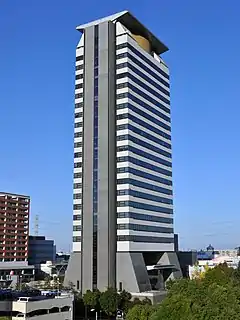Benesse
Benesse Corporation (ベネッセコーポレーション, Benesse Kōporēshon) is a Japanese company which focuses on correspondence education and publishing. Based in Okayama-City, it is the parent company of Berlitz Language Schools, which in turn is the parent company of ELS Language Centers. Benesse is listed on the Tokyo Stock Exchange (listing code 9783).
| Type | Public KK |
|---|---|
| TYO: 9783 | |
| Industry | Educational Services |
| Founded | January 28, 1955 |
| Headquarters | Okayama, Japan |
Key people | Eikoh Harada (President) |
| Revenue | |
Number of employees | 21,022 (consolidated) (2017) [1] |
| Subsidiaries | Berlitz Language Schools |
| Website | benesse |

Origin of the company name
The company name is derived from the Latin words "bene" (well) and "esse" (being).
Company history
The company was founded in 1955 as Fukutake Publishing Co., Ltd. (株式会社福武書店, Kabushiki-gaisha Fukutake Shoten) by Tetsuhiko Fukutake, as a publisher of educational materials. In 1986, Soichiro Fukutake succeeded his father as President on the latter's death.[2] In 1994, the company completed the construction of the Fukutake Shoten Tokyo Building (now Benesse Corporation Tokyo Building) in Tama-City, Tokyo. In April 1995, the company was renamed Benesse Corporation.
A major breakthrough in the company's history was the acquisition of a majority stake in Berlitz Language Schools, which had gone public in 1989. In 2001, Benesse completed the take-over by acquiring 100% ownership of Berlitz and making it a private company once again.
Benesse Foundation
The Benesse House is a 10-room hotel located inside a contemporary art museum on the island of Naoshima in the Seto Inland Sea.[3] Built in 1992, it is the only hotel on the island and was designed in partnership with architect Tadao Ando.[3] It was built by the Benesse Foundation which is funded by the Benesse Corporation.[3]
References
- Fact Sheet - Investor Relations
- "Annual Report 2007" (PDF). Archived from the original (PDF) on 11 February 2014. Retrieved 25 February 2017.
- Williams, Ingrid K (26 August 2011). "Japanese Island as Unlikely Arts Installation". The New York Times. Retrieved 13 December 2016.